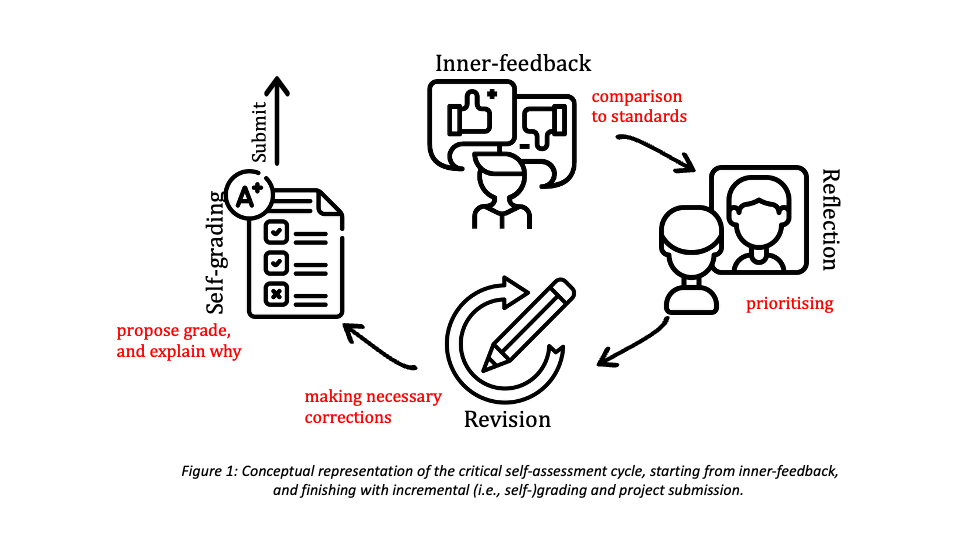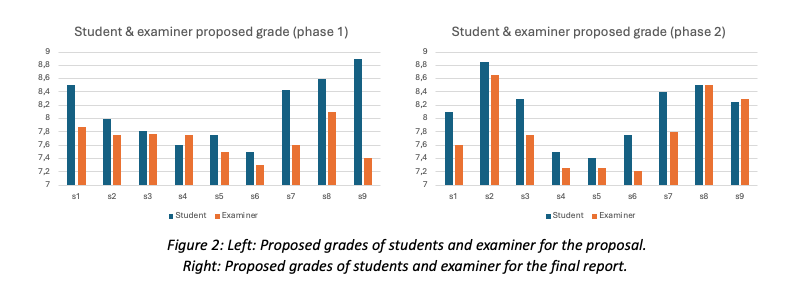Project introduction and background information
Effective self-assessment is a cornerstone of lifelong learning and professional growth, yet many BSc Soil, Water, and Atmosphere (BSW) students at Wageningen University submit assignments without critically evaluating their quality. Course evaluations, thesis supervision experiences, and lecturer observations reveal two main issues: (1) students often lack the attitude to engage in honest self-assessment, and (2) they may not possess the skills to judge their work against clear standards. This gap affects their confidence, weakens peer-feedback, and limits the potential of collaborative learning environments.
Furthermore, WUR’s Education Innovation Board has prioritized student-centred education and formative assessments as key focus areas. Student-centred learning requires learners to steer their own development, yet students need structured opportunities and tools to take ownership of their development. Observations from the Learn the Scientific Method in a Changing Climate course demonstrate that when students engage in peer-feedback, revision, and formative evaluation, their awareness of skills and knowledge grows significantly.
Building on these insights and existing concepts like inner-feedback and incremental grading, this project proposes embedding a four-step self-assessment cycle—inner-feedback, reflection, revision, and incremental grading—into strategically selected BSW courses. This approach strengthens formative assessment, develops personal leadership skills, and cultivates reflective, self-reliant scientists and citizens.
Objective and expected outcomes
The objective of this project is to embed critical self-assessment as a central competency within the BSc Soil, Water, and Atmosphere programme by implementing a structured four-step self-assessment cycle—inner-feedback, reflection, revision, and incremental grading—across selected courses. The project responds to recurring observations that students often submit work without evaluating its quality, leading to reduced confidence, ineffective peer-feedback, and missed learning opportunities.
The approach builds on established theoretical insights. Inner-feedback (Nicol, 2020) highlights that meaningful learning occurs when students compare their own performance against reference standards, generating knowledge themselves rather than relying solely on external feedback. Incremental grading (Köppe et al., 2020) empowers students to grade their own work using defined criteria, making assessment student-driven and fostering accountability. Although both methods are known in higher education and practiced at WUR, they have not been systematically combined or embedded within a longitudinal programme context.
The four-step cycle consists of:
- Inner-feedback – Evaluate work against defined criteria, identifying strengths and weaknesses.
- Reflection – Analyse and prioritise improvements, deciding on next actions.
- Revision – Implement changes and choose to submit or repeat the cycle.
- Incremental grading – Perform honest self-grading, with teacher feedback addressing differences.

By integrating these methods, the project strengthens student-centred education and formative assessment, fostering reflective, self-reliant scientists who can critically evaluate their work and collaborate effectively in real-world contexts.
Results and learnings
So far, this method has been fully implemented in the Learn the scientific method in a changing climate course. The method's results are presented in Figure 2 in a form of clustered column diagram where blue column represents students' proposed grade, whole orange column represents examiner's grade. Left figure depicts grades of students and examiner in the proposed in the early stages of the course (i.e., the proposal phase from the week 4 of the course), while right figure depicts the grades proposed at the end of the course (i.e., the report phase from the week 8 of the course).

We can see that alignment in grades between students and examiner improves over time. In phase 1 (proposal, left), student grades (blue) often exceeded examiner grades (orange), especially for s1, s7, and s9. In phase 2 (final report), the gap narrows for most students (e.g., s1, s2, s8, s9), indicating students calibrated their self-assessments after feedback and revision.
Several students initially rated their proposals higher (e.g., s7, s9) or lower (e.g., s5) than the examiners, with up to 20% difference between student's and examiner's suggested grade, suggesting that initial self-assessment skills varied widely. By the final phase, discrepancies are smaller (with less than 8% difference) and more consistent, showing that repeated use of self-assessment cycles (inner-feedback, reflection, revision, incremental grading) helps students better judge their work against formal standards.
The improved alignment suggests growing confidence in evaluating their performance, while also highlighting that structured reflection can reduce grade inflation or deflation tendencies. The progression demonstrates the value of integrating self-assessment into multiple stages of coursework, reinforcing its role in fostering student-centred learning, personal leadership, and supports formative assessment goals.
Recommendations
Bachelor programmes should expand and systematically integrate structured self-reflection into their curricula. While initial practices such as critical self-assessment through inner-feedback, reflection, revision, and incremental grading have shown promise in fostering self-awareness and student ownership of learning, students often struggle to connect these practices to broader skills like goal-setting and creative thinking which limits their effectiveness. Therefore, programmes should implement a structured framework to strengthen self-assessment's reflective practices, which would enable students to consciously guide their growth, make informed development choices, and strengthen their individual competencies. This approach would support students in becoming self-reliant, reflective, and capable of navigating complex academic and professional challenges.
